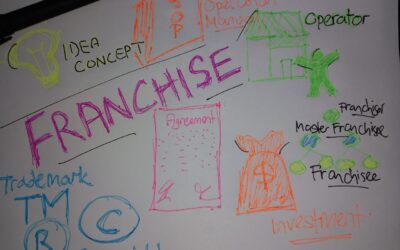
Last Sunday, 11th August 2022, I had the privilege to share my thoughts on the topic Franchise Consultation Course, Franchise Package 1 (Franchise Agreement and Disclosure Document). During Question and Answer, a Malay gentleman asked an interesting question about section 37A Franchise Act 1998. The question is “whether a licensing will be caught under section 37A” in relation to a concept similar to a franchise but not a registered franchise and whether it is a wrong under the Franchise laws.
I shall reproduced section 37A for better appreciation:
“A person who assumes or uses in relation to its business, the term “franchise” or any of its derivatives or any other words indicating the carrying on of a franchise business, including the use of the word “franchise” or any abbreviation thereof as part of the name or title in documents, agreements, books, advertisements or publications, without approval of registration by the Registrar under section 8 commits an offence and shall, on conviction, be liable—
(a) if such person is a body corporate, to a fine not exceeding two hundred and fifty thousand ringgit, and for a second or subsequent offence, to a fine not exceeding five hundred thousand ringgit; or
(b) if such person is not a body corporate, to a fine not exceeding one hundred thousand ringgit or to imprisonment for a term not exceeding one year or to both, and for a second or subsequent offence, to a fine not exceeding two hundred and fifty thousand ringgit or to imprisonment for a term not exceeding three years or to both.
Section 37A gave a very interesting approach on the use of the word ‘Franchise’. Technically it is an offence for anybody that assumes or uses the term ‘franchise’ or any of its derivative without the approval of registration by the Registrar. In that strict analogy, one cannot use such term or something to that effect.
The million-dollar question then in everybody’s mind, what about a license or the terminology “Licensing” which is a loose concept of an unregistered franchise.
One will have to understand the difference between franchising and licensing and its key differences. Notably, there is no legal definition within any Act of Parliament in relation to the word “Licensing” and what does the term license means. The concept in itself is not governed by any specific legislation compare to a franchise which we all know governed by the Franchise Act 1998.
The one key difference between franchising and licensing is registration with the Ministry of Domestic Trade and Consumer Affairs, namely section 8. Armed with the certificate of registration, business in whatever concept flourish under a franchise system.
Registration in franchising falls under section 7 and 11 of the Act which I now reproduced it as follows
7(1) A franchisor shall make an application to register his franchise by submitting to the Registrar the application in such form as may be determined by the Registrar together with the prescribed fee and —
(a) the complete disclosure documents with all the necessary particulars filled in;
(b) a sample of the franchise agreement;
(c) the operation manual of the franchise;
(d) the training manual of the franchise;
(e) a copy of the latest audited accounts, financial statements, and the reports, if any, of the auditors and directors of the applicant; and
(f) such other additional information or documents as may be required by the Registrar for the purpose of determining the applicant
7(2) At any time after receiving an application and before it is determined, the Registrar may, by written notice, require the applicant, or the director or manager of the applicant, to provide additional information or documents.
7(3) The matters specified under paragraph (1)(f) or the requirements under subsection (2) may differ as between different applicants, or different classes, categories or descriptions of applicants.
7(4) An application under this section may be withdrawn at any time before it is approved or refused.
7(5) If any additional information or document required under subsection (2) is not provided by the applicant or his director or manager within the time specified in the requirement or any extension of time granted by the Registrar, the application shall be deemed to have been withdrawn and shall not be further proceeded with, but without affecting any fresh application being made by the applicant.
7(6) A person who submits false or misleading information or documents under this section commits an offence.
I also reproduced section 11 below:-
11(1) If there is any material change in the documents mentioned in paragraphs 7(1)(a), (b), (c), (d) and (f), the applicant or his director or manager shall, with the approval of the Registrar, amend the documents according to the prescribed form.
11(2) The documents in subsection (1) shall be filed with the Registrar together with the prescribed fee”.
11(3) The Registrar may, at any time, require additional information on the amendments made under this section.
11(4) Any person who fails to comply with this section commits an offence
Under the definition section of the Act, “franchise” means a contract or an agreement, either expressed or implied, whether oral or written, between two or more persons by which—
(a) the franchisor grants to the franchisee the right to operate a business according to the franchise system as determined by the franchisor during a term to be determined by the franchisor;
(b) the franchisor grants to the franchisee the right to use a mark, or a trade secret, or any confidential information or intellectual property, owned by the franchisor or relating to the franchisor, and includes a situation where the franchisor, who is the registered user of, or is licensed by another person to use, any intellectual property, grants such right that he possesses to permit the franchisee to use the intellectual property;
(c) the franchisor possesses the right to administer continuous control during the franchise term over the franchisee’s business operations in accordance with the franchise system; AND
(d) in return for the grant of rights, the franchisee may be required to pay a fee or other form of consideration.
This is known to many as the element of franchise.
The phrase “either expressed or implied, whether oral or written” used in the definition above, is somewhat confusing in which the courts will have to look actual operations of the business to determine whether it is a franchise or a licence under the Act.
With that in mind, the case of Dr H K Fong Brainbuilder Pte Ltd v Sg-Maths Sdn Bhd & Ors [2018] MLJU 682 came to point. Even though the Master License Agreement in question was not titled a “franchise” nor did it use the word “franchise”, the High Court held that it is not bound by the label or description given by the parties to the agreement. The Court went on to conclude that a perusal of the Master License Agreement clearly showed that it fulfilled all four elements constituting a “franchise” and thus, the Franchise Act applied to the “Master License Agreement”. (The four elements are stated above (a)-(d))
If that is the case, Dr HK Fong, would demonstrate that many business concepts can fall within the meaning of franchise. Meaning to say, words used in an agreement such as a “cooling off statement”, “royalty payment” etc, or other derivative under section 37A would renders a license business concept situation being an offence? That in my opinion, is a stretch too far.
In my presentation on Monday, I asked, would the word “royalty payment” or “cooling off statement” are exclusive only to franchise? My immediate answer to that is, I don’t think so! Only upon registration of a franchise would the law and regulation of franchising exclusively cover the concept.
The franchise agreement will still be void even if there is an approval for registration, but the approval comes after the commencement of franchise agreement. The case at hand is the case of SP Multitech Intelligent Homes Sdn Bhd v Home Sdn Bhd [2010] MLJU 1845. The plaintiff franchisee operated a retail smart home concept chain store franchise. When the plaintiff was offered the franchise business, the business had not been registered with the Registrar of Franchise.
An interesting case at hand that will assists us further is the High Court appealed case of Tea Delights (M) Sdn Bhd v Yeap Win Nee [2015] MLJU 673.
The appellants appealed to the High Court against the decision of a sessions court who declared the franchise agreement void ab initio. This case concerns a bubble tea franchise “COMEBUY”. The High Court held that the Defendants (of which the first Defendant is a master licensee) had a duty to register the franchise. The High Court went on to state that in such circumstances, no court will lend its aid to enterprises who failed to register the franchise prior to commencement of the business. The High Court also cited section 66 of the Contracts Act 1950 and held that the failure to register the franchise also meant that the plaintiffs were free to make a claim for restitution.
With that, the cases above illuminating the importance of abiding by the requirements of approval and registration under the Act. If a business falls within the definition of a franchise, compliance with the Act is paramount. Failure to conform made it an offence under the law.




0 Comments